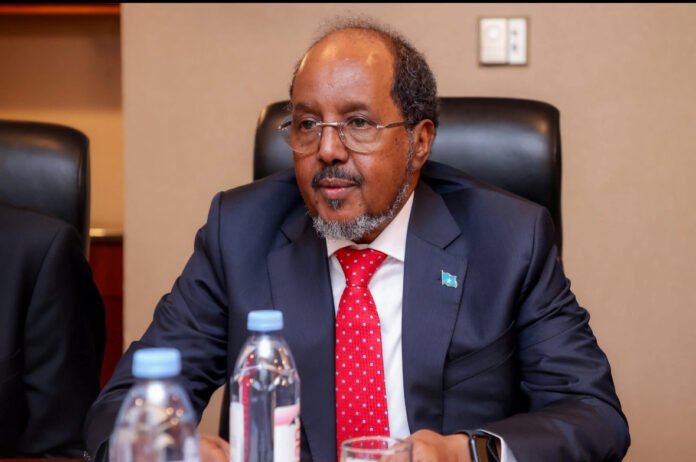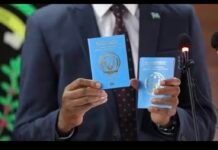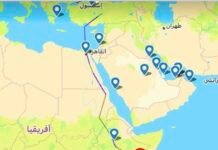NEW YORK, (HAN) – Somali President Hassan Sheikh Mohamud has met with senior U.S. officials in New York, where both sides reaffirmed their commitment to strengthening bilateral ties, enhancing security cooperation, and advancing stability across the Horn of Africa.
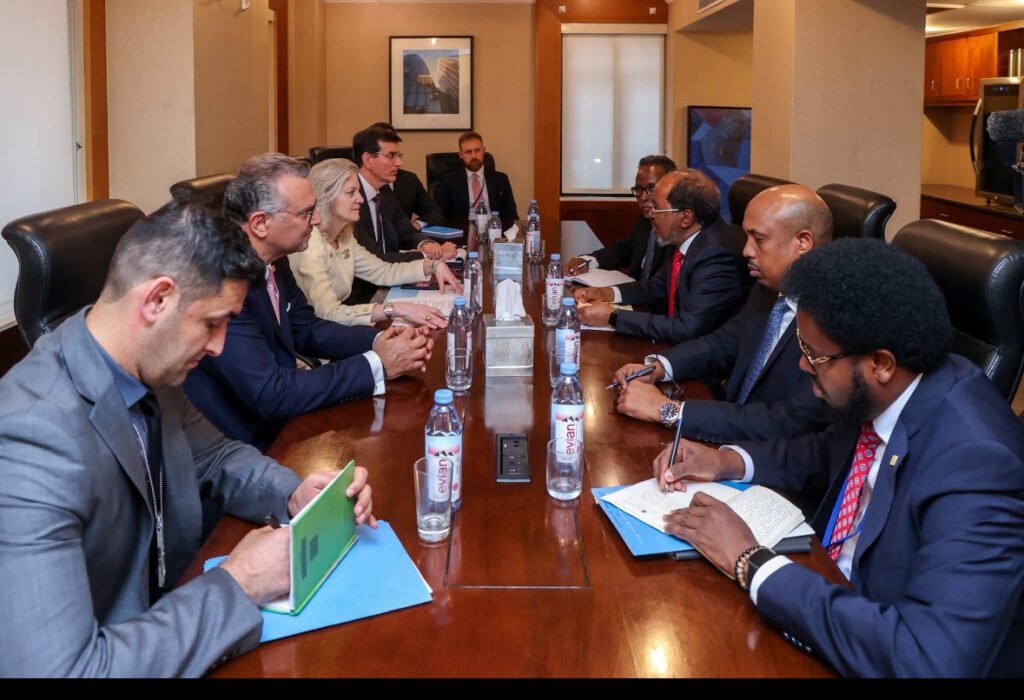
The meeting brought together President Mohamud and three senior American officials: Allison Hooker, Head of Political Affairs at the U.S. Department of State; Massad Boulos, Africa Adviser to former President Donald Trump; and Vincent Spera, Deputy Assistant Secretary for African Affairs.
According to diplomatic sources, the discussions revolved around three central pillars: deepening political relations, intensifying counterterrorism cooperation, and promoting peace across the wider region.
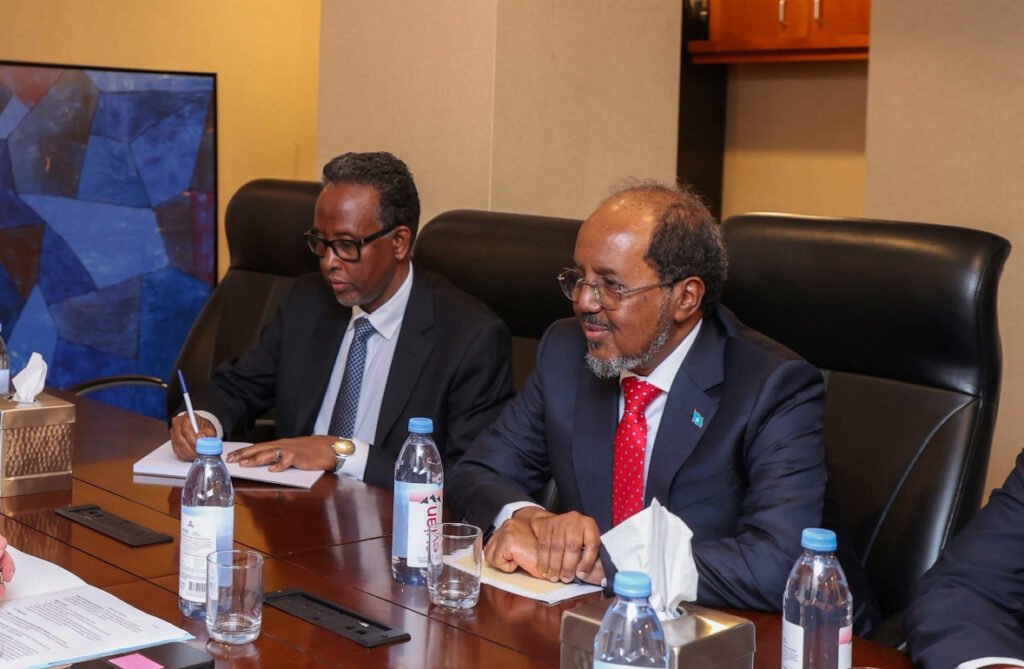
President Mohamud reaffirmed Somalia’s commitment to what he called a “strategic partnership” with Washington. He stressed that such cooperation is “vital for the stability and development of the Horn of Africa,” particularly as Somalia confronts extremist threats and works to rebuild state institutions after decades of conflict.
Since regaining diplomatic recognition from Washington in 2013, Somalia has sought to position the U.S. as its most important international ally. American support has been crucial in strengthening Somali governance, rebuilding its military, and keeping pressure on al-Shabaab, the al-Qaeda-linked group that continues to control swathes of rural territory.
Relations between Washington and Mogadishu have experienced dramatic highs and lows over the past three decades.
• 1990s: Following the collapse of Somalia’s central government in 1991, the U.S. became involved in humanitarian and peacekeeping operations. The 1993 “Black Hawk Down” incident in Mogadishu, in which 18 American soldiers were killed, marked a turning point that led to the withdrawal of U.S. forces and years of limited engagement.
• 2000s: U.S. policy shifted toward counterterrorism as Somalia became a haven for militant groups. Washington supported African Union peacekeeping operations and carried out targeted strikes against al-Shabaab leaders.
• 2010s: With the rise of piracy off Somalia’s coast threatening global shipping, U.S. naval forces spearheaded international efforts to protect maritime routes in the Gulf of Aden and the Indian Ocean. At the same time, Washington expanded development and humanitarian aid to support Somalia’s recovery from drought and famine.
• 2020s: In recent years, U.S. administrations have maintained military support through drone strikes, special forces deployments, and training for Somali troops, while also pressing Mogadishu to advance political reconciliation, federalism, and anti-corruption reforms.
During the New York talks, both governments placed special emphasis on counterterrorism cooperation. Somalia remains locked in a long struggle with al-Shabaab, which has staged deadly attacks in Mogadishu, across Somalia’s regions, and even in neighboring Kenya.
The Somali government is now overseeing a phased handover of security responsibilities from the African Union Transition Mission in Somalia (ATMIS) to its own security forces. This process, expected to conclude in 2025, requires significant international support to avoid creating a security vacuum.
U.S. officials reaffirmed Washington’s commitment to supporting Somali security institutions, but also stressed the importance of governance reforms to ensure that military progress is not undermined by political instability or weak service delivery.
The talks also highlighted the broader geopolitical stakes. The Horn of Africa is one of the world’s most strategically important regions, controlling access to the Red Sea and the Gulf of Aden — a chokepoint for international trade and energy supplies.
Somalia’s instability has long been viewed as a global concern. Piracy, terrorism, and mass displacement from the country have affected not only its neighbors but also international security.
At the same time, Ethiopia’s internal crises, Eritrea’s militarized politics, and Sudan’s civil war are reshaping regional dynamics. For Washington, supporting Somalia’s stability is part of a larger strategy to secure the Horn of Africa against extremist groups and geopolitical competitors.
Beyond security, U.S.–Somalia cooperation has expanded into humanitarian and development assistance. Somalia is one of the largest recipients of U.S. humanitarian aid, particularly in times of drought and famine. Millions of Somalis rely on U.S.-backed food security programs, healthcare projects, and resilience initiatives designed to reduce dependence on emergency relief.
Washington has also supported Somalia’s debt relief efforts through the World Bank and International Monetary Fund (IMF), opening the door to more sustainable economic growth and access to international credit.
For President Hassan Sheikh Mohamud, strengthening ties with Washington is part of a long-term vision to rebuild Somalia’s sovereignty, security, and economy. His government hopes to leverage U.S. support not just for immediate counterterrorism needs, but also for the broader state-building project that Somalia has struggled to complete since 1991.
While challenges remain daunting — from al-Shabaab’s resilience to political divisions between Somalia’s federal government and its member states — the meeting in New York signals renewed U.S. confidence in Mogadishu’s current leadership.
As one regional analyst put it: “Somalia understands that no single country can confront its crises alone. But with consistent U.S. support, Mogadishu has a stronger chance of moving from fragility to stability — and eventually, prosperity.”

